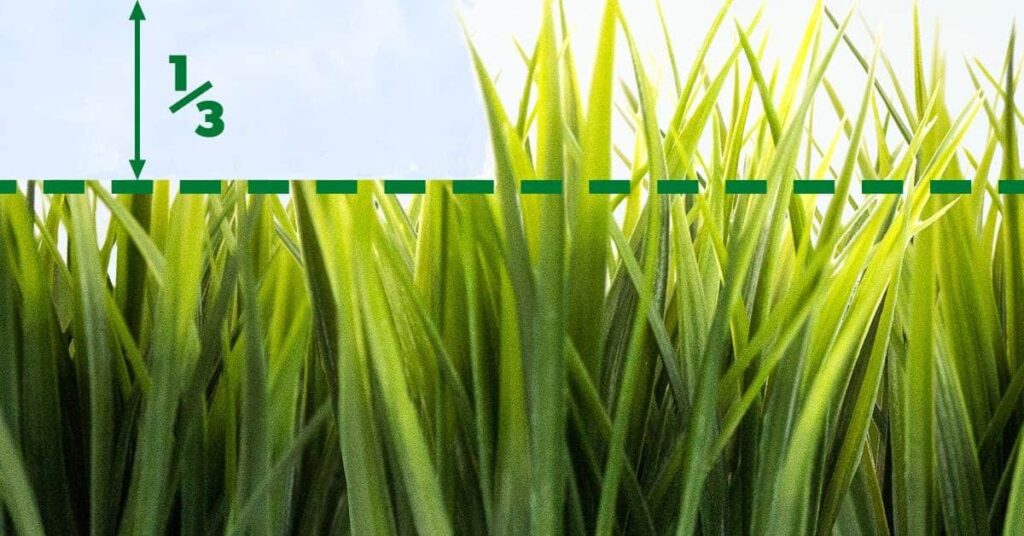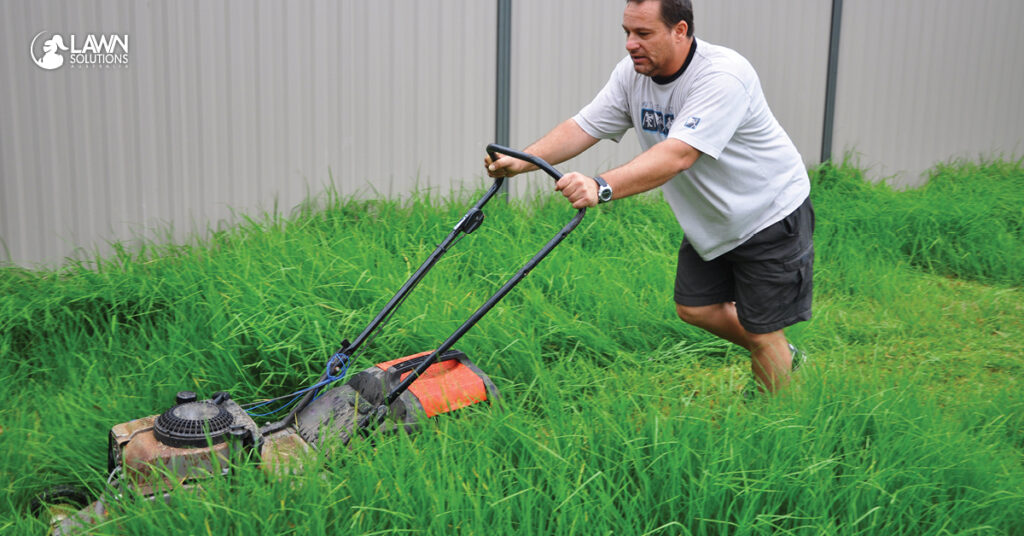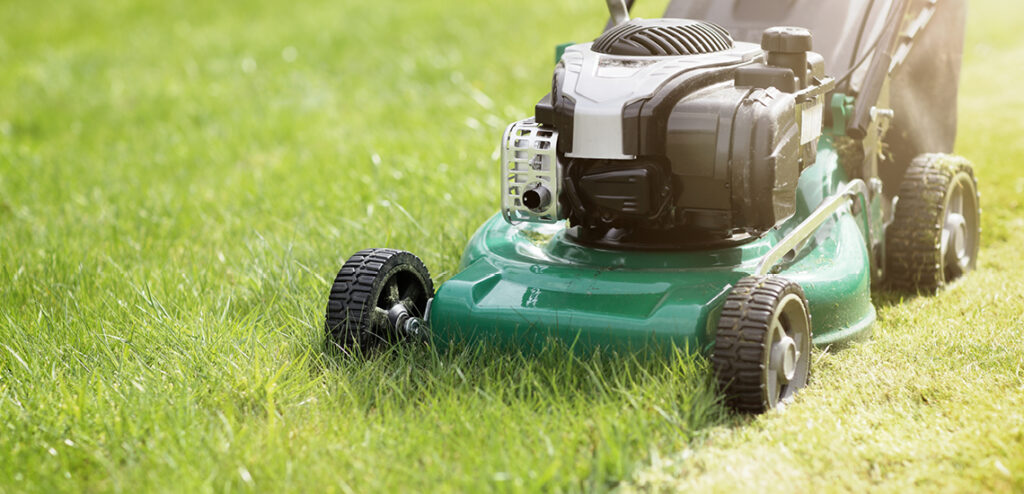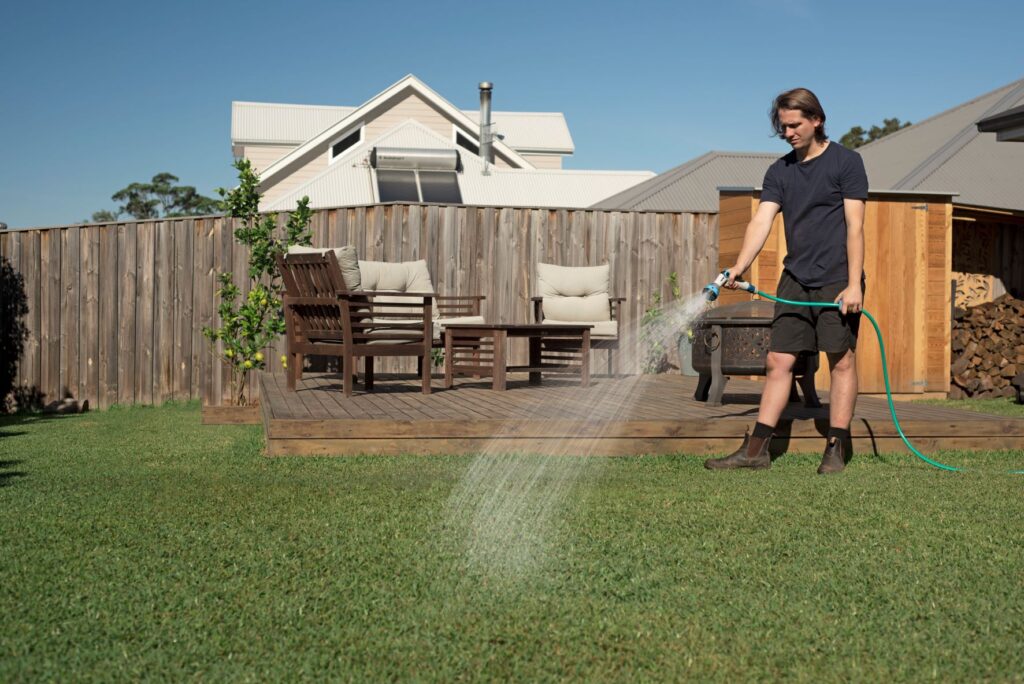Have you ever returned after a long weekend away to discover that your lawn has grown out of control? Or did you accidentally miss a few cuts (we’re all busy), leaving you with a challenging lawn to take care of?
An overgrown lawn can be intimidating but don’t worry; we’ve got a few tricks up our sleeves to help you restore your lawn back to a more reasonable height.
Mowing rule of thumb
A general rule of thumb when mowing is to only remove one-third (1/3) of the leaf blade with each mow. By raising the mowing height to accommodate this, you will be able to ensure that you will not be removing too much of the leaf blade at once.
When you remove more than one third of the leaf blade at one time the lawn can become scalped, and you will be cutting into the stem of the grass. This can result in a deterioration in your plants’ health and a patchy-looking lawn.

Mowing an overgrown lawn after a few days or weeks
If your lawn has gone without a mow for a few weeks, you may need to raise the mower height to ensure you are not removing too much of the leaf blade at once and badly scalping into the lawn.
To get your mowing height correct, we suggest mowing over a small area first on a high setting. This will ensure you don’t accidentally scalp it and you can bring the level down from there if required.
If the lawn does need to go lower, we recommend waiting 3 days before giving the lawn another mow to bring it down further.
On the next mow, follow the same process of adjusting your mowing height and wait another 3 days before the next mow.
You can continue with this process until you reach your desired mowing height.
Patience is key
While mowing your lawn back down to its original height may be tempting, it is best to be patient and slowly bring the height of the mower down, so that the plant will remain healthy. Although this process takes time, you will cause less stress to the grass and won’t undo all of your hard work that it took to get your lawn into a great shape in the first place.

Overgrown lawn above knee height
When your lawn has crept up on you and is past knee height, a different approach may be necessary. Taking the lawn down gradually will take too long and you will likely end up scalping the lawn regardless.
If the lawn is too high to use a mower, it is best to reduce the height with a whipper snipper. This should aid in getting the lawn down to a height that can then be mown.
Once the lawn is at a height that can be mown, you can bring the lawn right back down with your mower. A notch lower than your normal mowing height is best depending on your grass variety. If you have Buffalo grass it is important to not go too low and damage the runners it needs to repair from.
LAWN RECOVERY
After you do this, your lawn will not be in the best shape with very little leaf and will need to recover in the following weeks. During this recovery period, it is best to keep water up to the lawn and continue to mow regularly back at your normal mowing height. This will allow the leaf to grow back at your desired level.
Once the lawn has started to recover and has some new green growth, you can fertilise. It is important to not fertilise straight after it has been mown down as this can create more stress for the grass. It is not recommended that you do this in the cooler months.
In spring and summer, the lawn should be able to recover in a few weeks as growing conditions are ideal. But in autumn and winter, the lawn will take longer to repair as the grass’s growth will slow down as the temperature drops.
How can I stop my lawn from becoming overgrown?
By consistently mowing your lawn, the turf will be more consistent in growth, healthier, less susceptible to weeds, pests and diseases and will look great.
Mowing will not only become an easier task when done frequently but will help your lawn flourish over time.

What should I do to my lawn before I go away?
If you are going away, best to mow the day before you are set to leave or close to your departure. Although it is tempting to mow your lawn nice and short, so it doesn’t get too out of hand, it is best to leave your mower height as normal. If you are planning on going away for more than a week in the growing months, it may be best to arrange someone to mow it for you.
If you are going away over the warmer months, you may want to look at using a PGR (Plant Growth Regulator) such as Primo Maxx. A PGR will help slow down the growth of your grass, requiring you to mow your lawn less frequently. You can find more information on PGR’s here.

What is an ideal mowing height?
Different turf varieties do have differing mowing heights. To see what mowing height is best for your lawn, check out our blog, ‘The Height of Your Lawn‘.
For more information on mowing your lawn, check out more of our lawn care blogs.



